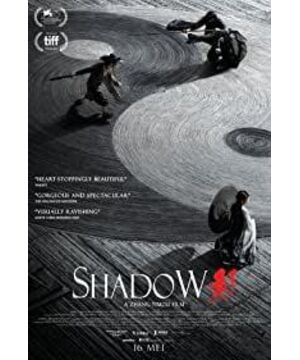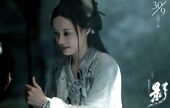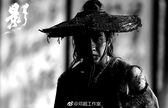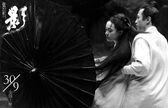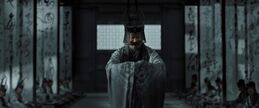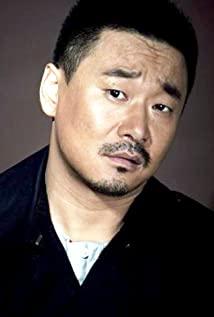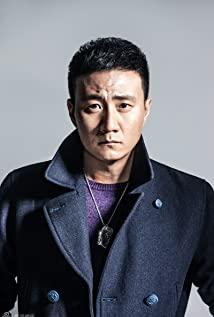To this day, the discussion on "Whether the fifth-generation directors are cheap and old" seems uninteresting. After the creative stage of ideological exploration, formal innovation and capital coercion, how to maintain the original author status in his own works has become the biggest problem faced by these characters who have become models themselves. Zhang Yimou's "Shadow" is the latest work of a director who is one of the undisputed leaders of the fifth generation. It is not only an opportunity to reaffirm Zhang's aesthetics to the general audience, but also an inquiry to the author's self-discovery, a concise narrative. Like the title of the film with the same word as the picture, it evokes reverie before viewing, and arouses contemplation after viewing. Regardless of the evaluation of the film itself, the generation of this contemplation itself shows that the fifth generation, as an aesthetic fact, still has a huge appeal to scrutiny.
Pei country monarch Liang (Zheng Kai) was dissatisfied with the great governor Zi Yu (Deng Chao) and Yang Cang, the general of the Yan State he wanted to repair. He opened the killing ring, intending to permanently fix the secrets he mastered about Zi Yu and his substitutes under his own throne. Intrigue was originally one of the symptoms of "looking backwards" in Chinese films that have been constantly criticized. In "Shadow", the serial reversal of the climax at the end is not much in the eyes of audiences experienced in reading relevant texts. Surprisingly, however, Zhang Yimou turned this dark court struggle into a visual show rich in his personal style symbols. In the opening chapter of the court, the costumes worn by the characters clearly show the grayscale of ink and wash that is not within the scope of identification of any dynasty. There are superficial images that overwhelm the character's scheming. Zi Yu and his stand-in Jingzhou (both played by Deng Chao) and his wife Xiao Ai (Sun Li) study the method of defeating the enemy. Providence swirls the pen in neutral tones. The fate of the characters is highly unified with the freehand spirit of Chinese ink painting, condensingly conveying the creator's concern and thinking about fate and its changes. This kind of treatment is concretely and meticulously reflected in the scenes and objects such as the scenes and objects such as the mountains and rivers in the heavy rain, the decoration of the protagonist's palace or interior, and the sword array umbrellas in the hands of the warriors who raided Jingzhou. They are all external accessories that try to return to their original state. At the same time, it also bears the internal driving force to promote the development of narrative, and expresses nature itself in the form of imitating nature.
This also makes the popular actors used in the film effectively strip away their idolatry in the eyes of the world. Deng Chao plays two roles, and naturally wanders between extreme emotions such as ruthlessness, hesitation, despair, and desperation in the film. Said to be the best performance since "Scorching Sun". The so-called "good" is a kind of rebirth, which is completely different from the almost monotonous performance posture of the two people. In order to suffer the temperament of the character itself. In the film, Deng Chao's performance is the perfect match for Zheng Kai, who plays the monarch. He completely hides his high-spirited attitude in modern fashion dramas, and replaces it with explicit and implicit intrigue and madness. The two roles played by these two actors effectively set the stage for the overhead effect of Shadow's somber tones.
In "Shadow", there is no specific and realistic historical time and space. There are only two countries and two cities shrouded in mist and rain. The logic of the story development also follows the usual linear development. In the "country-war-country" pattern, Zhang Yimou seems to have consciously avoided all kinds of auxiliary music used to exaggerate emotions, and replaced it with guqin (especially the sound of killing played by Ziyu and Xiaoai during the war). Complexity) appears in the moment of emotional flow, and the crispness and aftertaste of guqin sounds different from those of modern musical instruments effectively complement the overall freehand feel of the picture. Although at the level of "white space", the presentation of the film has a certain meaning distance from traditional landscape painting, but the relatively full visual space strongly highlights the changes in the mentality of the characters wandering in it. In a voyeuristic situation similar to that set in Zhang Yimou's work "Ju Dou" at his peak, the shadowy white wall and the gloomy and damp cave constitute an implicit connection between the film's narrative and the film's source. For Zhang Yimou, his relationship with movies has been shown in many short and long works in the past. In "Shadow", it is directly conveyed by his best visual language. It's not the same way as Hou Hsiao-hsien's movement in "Assassin Nie Yinniang".
To a certain extent, "Shadow" can be regarded as the brave work of Zhang Yimou and the fifth-generation directors he represents (obviously Chen Kaige's "The Legend of the Demon Cat" at the end of last year failed to fully achieve this), it shows that It is a possibility that after the great changes in the Chinese film industry, it can still effectively accommodate the creators' own expressive desires. This possibility is of course a little less convincing because it appears on Zhang Yimou rather than others. In fact, from the other side, as the most famous fifth-generation director in the whole country, Zhang Yimou's new film can be praised by the audience as "" It is undoubtedly a considerable positive aspect to treat and praise the value judgment of "art film". At the end of "Shadow", people's desires are constantly stripped of their already very simple coats, naked and flesh-and-blood way of self-declaring their crimes and punishments. In today's Chinese costume films, it can be said that it is rare, and therefore, blood itself is also It has become Zhang Yimou's latest writing representation. It is not only related to the discussion of words such as "scale", "original" and "censorship", but can also be directly included in the comprehensive sorting and re-understanding of Zhang Yimou's works in the past.
In this way, Zhang Yimou, who has had a strong heart since "Red Sorghum" or earlier since "One and Eight" and "Yellow Earth", still has the urge to speak through the screen. The blood of no-regret movies that originated at the beginning of the new era is still flowing in this way. As for the relationship with Akira Kurosawa's "Shadow Warrior", it can also be directly included in such impulses and interpreted together.
View more about Shadow reviews


